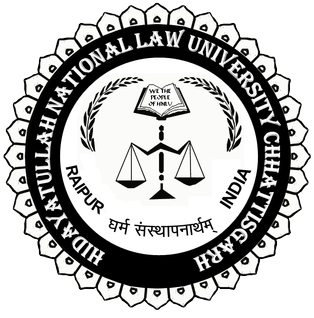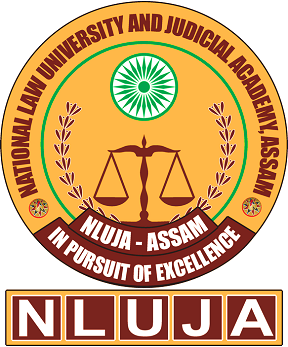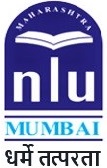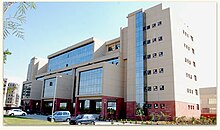
National Law School of India University (NLSIU), or simply National Law School(NLS), is a public law school and a National Law University in Bangalore. The university was established by the NLSIU Act of 1986, which was passed by the Karnataka Legislative Assembly.

The West Bengal National University of Juridical Sciences is a National Law University (NLU) located in Bidhannagar, Kolkata, West Bengal, India. In 2023, it was ranked 4th among law colleges in India by National Institutional Ranking Framework and 2nd by India Today. It comes under the exclusive chancellorship and purview of the Chief Justice of India.

National Law University, Jodhpur (NLUJ) is a public law school and a National Law University established under the National Law University, Jodhpur, Act, 1999 enacted by the Rajasthan State Legislature. The university was established for the advancement of learning, teaching, research and diffusion of knowledge in the field of law. It is one of the autonomous law schools in India.

The National Academy of Legal Studies and Research (NALSAR), is a public law school and a National Law University located in Shamirpet, Hyderabad, Telangana, India, and is considered as one of the best law schools in India.

National Law Institute University Bhopal is a public law school and a National Law University located in Bhopal, India. Established in 1997 by the State of Madhya Pradesh, it is the second law school established under the National Law School system. In 2022, it was ranked third among law colleges in India by India Today. The university launched its first academic program in 1998, with Indian jurist V.S. Rekhi as the Director. Recognized by the Bar Council of India, the university admits around 120 candidates each year through the Common Law Admission Test UG, for the B.A. LL.B (Hons.) Course and around 60 candidates for the B.Sc. LL.B. (Hons.) [Cyber Security] Course. The post-graduate courses offered at the university are the Masters of Law (LL.M.) degree and the Master of Cyber Law & Information Security (MCLIS) degree.

National Law Universities (NLU) are public law schools in India, founded pursuant to the second-generation reforms for legal education sought to be implemented by the Bar Council of India. The first NLU was the National Law School of India University aka NLS/NLU Bangalore which admitted its first batch in 1988. Since then, most of the states in India have NLUs. Currently there are 27 NLUs across the country out of which one is an off-centre campus of NLU Gandhinagar, GNLU SILVASSA Campus. Since the inception of NLUs, these law schools have continuously been ranked as India's most and world's one of the most prestigious and premier law schools by various agencies and are also referred as IITs of Legal Education.

Hidayatullah National Law University (HNLU) is a public law school and a National Law University located in New Raipur, Chhattisgarh, India. It was named after the former Chief Justice of India, Mohammad Hidayatullah. It is one of the autonomous law schools in India and sixth in the series of such national law schools. It was established as a centre for legal excellence by the Government of Chhattisgarh under the Hidayatullah National University of Law, Chhattisgarh Act. The university offers a B.A. LL.B. (Hons.) integrated Program, an L.L.M. Program, and a PhD Course.

The Faculty of Law, University of Delhi is the law department of the University of Delhi. It has the unique distinction of producing the largest number of sitting judges of the Supreme Court of India.

Dr. Ram Manohar Lohiya National Law University, also known as RMLNLU or NLU Lucknow is a public law school and a National Law University located in Lucknow, Uttar Pradesh, India. It was established as Dr. Ram Manohar Lohiya National Law Institute undergraduate and post-graduate legal education, later in 2006 it was renamed as RMLNLU to give a NLU touch to its name. It is one among the 26 NLUs across India and the first one established in Uttar Pradesh. It is among the top 10 National Law Universities / Law colleges in India.

The Common Law Admission Test (CLAT) is a centralized national-level entrance test for admissions to the 25 out of 27 National Law Universities (NLU) except NLU Delhi and NLU Meghalaya. CLAT was first introduced in 2008 as a centralized entrance examination for admission to the National Law Schools/Universities in India.

Chanakya National Law University (CNLU) is a public law school and a National Law University in Patna, Bihar, India. It was established in 2006 by the Government of Bihar as a public university dedicated to the field of legal education. The Chief Justice of Patna High Court is the ex officio chancellor of the university. It is one of the autonomous law schools in India. The campus is bogus right near the heart of the city in the Mithapur area and has an area of approximately 18 Acres.

National Law University Odisha (NLUO) is a public law school and a National law University in India located at Cuttack, Odisha. It was established in 2008 under the National Law University Odisha Act, commencing its first batch from July 2009. The institute offers undergraduate courses, and post-graduate courses in law. It is one among the 25 NLUs in the country.

National University of Study and Research in Law (NUSRL) is a National Law University located in Ranchi, Jharkhand, India. It was established by a legislative act, by the State of Jharkhand as the fourteenth National Law University of India. The statute provides for the Chief Justice of India or a Senior Supreme Court Judge to serve as the Visitor of the university.

National Law University and Judicial Academy, Assam is a National Law University located in Guwahati, Assam, India. It was established in 2009 through an Act passed by the State Legislature of Assam as a public university dedicated to the field of legal education.

Maharashtra National Law University, Mumbai is a National Law University located at Mumbai, Maharashtra, India.
Vijender Kumar is a professor of Law and currently serving as the Vice-Chancellor of Maharashtra National Law University, Nagpur, a National Law University in Nagpur, Maharashtra, India. With his experience as a legal professional at Bar Council of India, and also as an Academic administrator in Indian legal realm, Kumar is regarded as one of the authorities on the subject of Family law in India.

Professor (Dr.) G.S. Bajpai is an Indian professor and the incumbent Vice-Chancellor of National Law University Delhi. He was the former Registrar of the National Law University Delhi from September 2014 - May 2021. He was subsequently appointed as the Vice-Chancellor of Rajiv Gandhi National University of Law and served in the position till February 2023.

Maharashtra National Law University, Nagpur (MNLU) is a National Law University and a public law school established by the government through the Maharashtra National Law University Act. The university is the 19th National Law University established in India and is located in the Orange City of Nagpur, Maharashtra. Hon'ble Supreme Court Justice Bhushan Ramkrishna Gavai serves as the chancellor of the institution.
Professor (Dr.) Sri Sri Sri Srikrishna Deva Rao is the Vice Chancellor of NALSAR University of Law, Hyderabad and a teacher and scholar in criminal law and access to justice.

V. K. Ahuja is a Senior Professor at the Faculty of Law, University of Delhi, India He is presently serving as Director of Indian Law Institute, New Delhi, India, he has also served as Vice-Chancellor of National Law University and Judicial Academy, Assam (NLUJAA), India. He has been a legal academic in the field of Intellectual Property Rights and International Law.






















